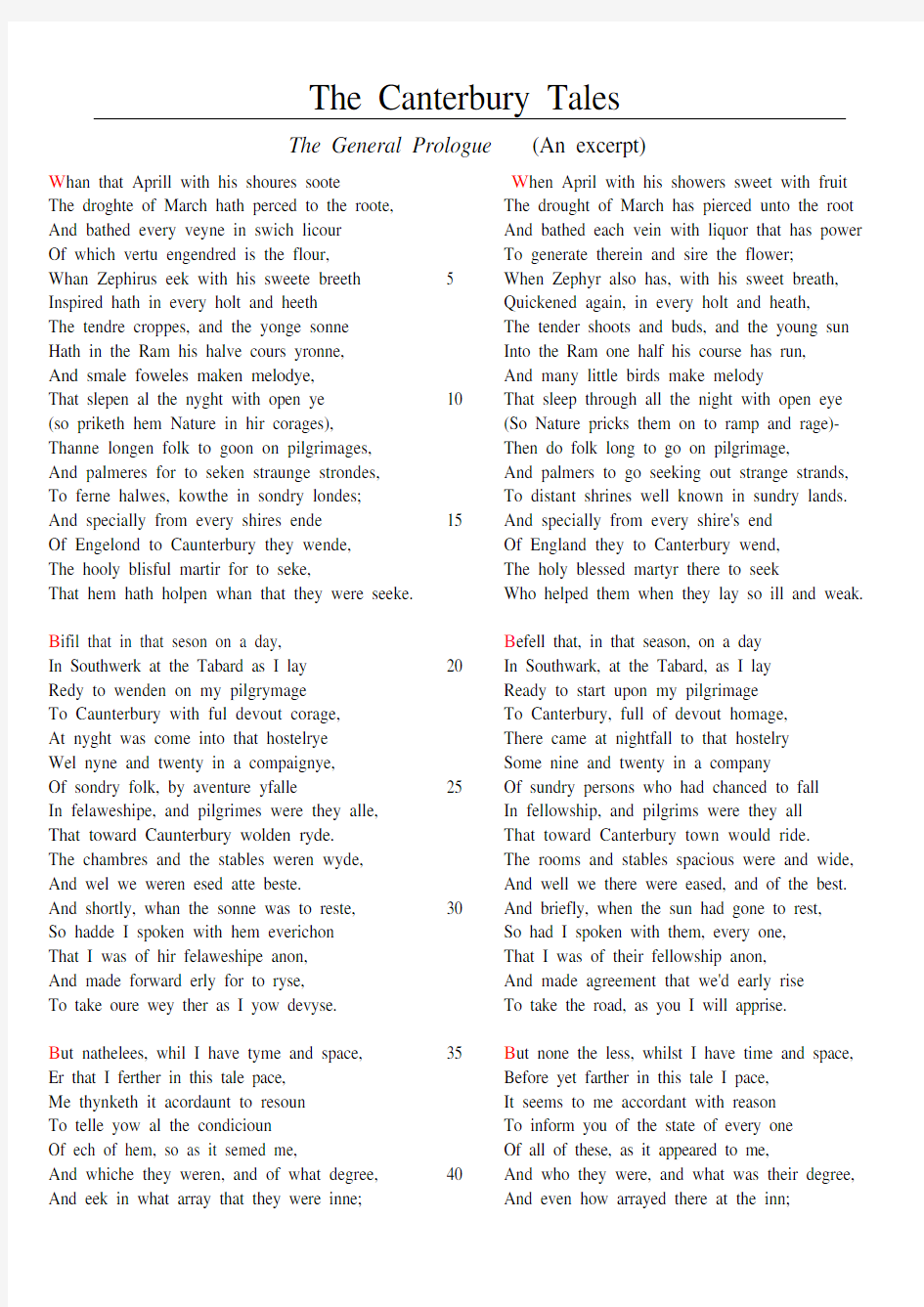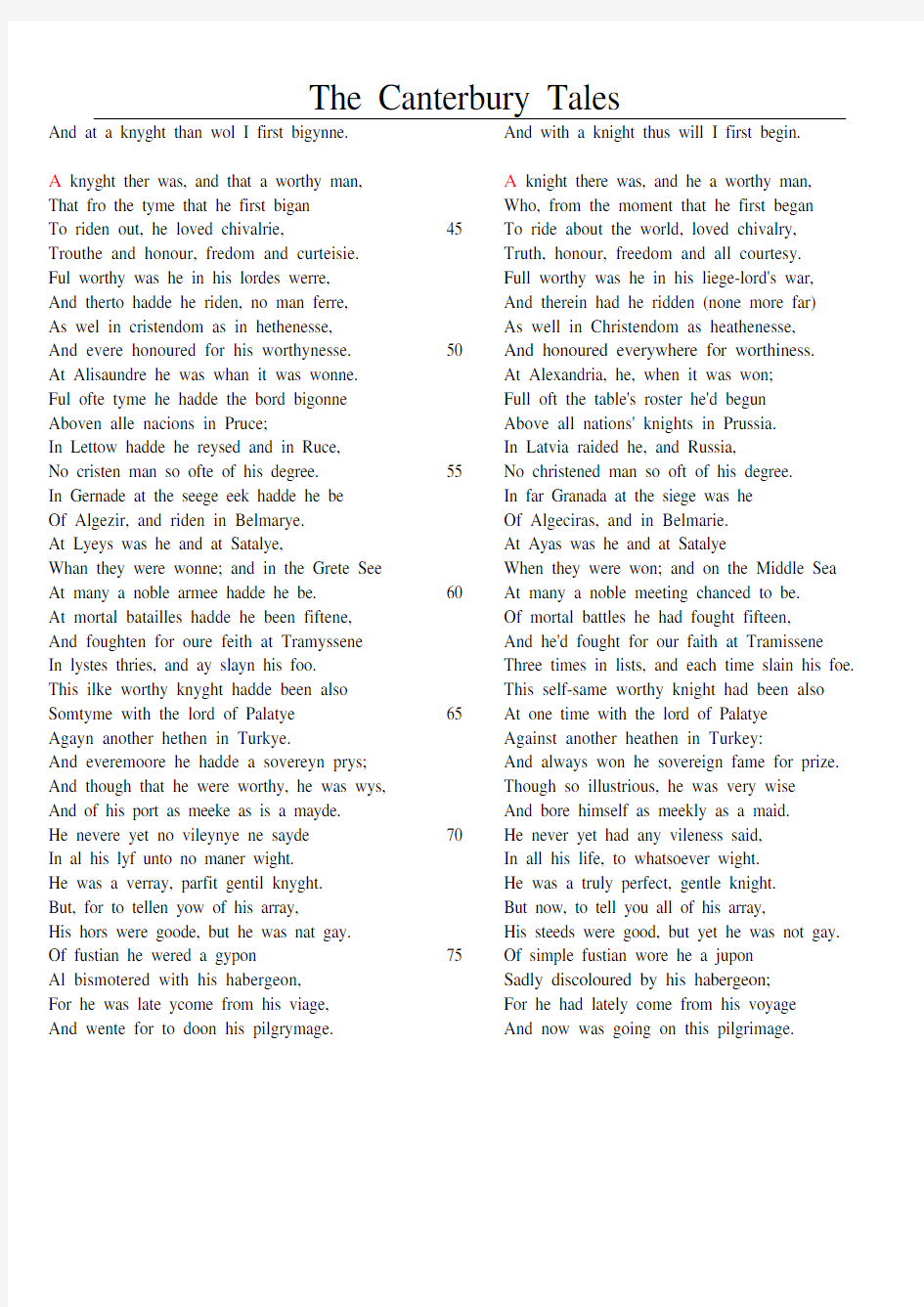The General Prologue 打印版


The General Prologue (An excerpt) W han that Aprill with his shoures soote
The droghte of March hath perced to the roote,
And bathed every veyne in swich licour
Of which vertu engendred is the flour,
Whan Zephirus eek with his sweete breeth Inspired hath in every holt and heeth
The tendre croppes, and the yonge sonne
Hath in the Ram his halve cours yronne,
And smale foweles maken melodye,
That slepen al the nyght with open ye
(so priketh hem Nature in hir corages),
Thanne longen folk to goon on pilgrimages, And palmeres for to seken straunge strondes,
To ferne halwes, kowthe in sondry londes;
And specially from every shires ende
Of Engelond to Caunterbury they wende,
The hooly blisful martir for to seke,
That hem hath holpen whan that they were seeke.
B ifil that in that seson on a day,
In Southwerk at the Tabard as I lay
Redy to wenden on my pilgrymage
To Caunterbury with ful devout corage,
At nyght was come into that hostelrye
Wel nyne and twenty in a compaignye,
Of sondry folk, by aventure yfalle
In felaweshipe, and pilgrimes were they alle, That toward Caunterbury wolden ryde.
The chambres and the stables weren wyde,
And wel we weren esed atte beste.
And shortly, whan the sonne was to reste,
So hadde I spoken with hem everichon
That I was of hir felaweshipe anon,
And made forward erly for to ryse,
To take oure wey ther as I yow devyse.
B ut nathelees, whil I have tyme and space,
Er that I ferther in this tale pace,
Me thynketh it acordaunt to resoun
To telle yow al the condicioun
Of ech of hem, so as it semed me,
And whiche they weren, and of what degree, And eek in what array that they were inne; 5
10
15
20
25
30
35
40
W hen April with his showers sweet with fruit
The drought of March has pierced unto the root
And bathed each vein with liquor that has power
To generate therein and sire the flower;
When Zephyr also has, with his sweet breath,
Quickened again, in every holt and heath,
The tender shoots and buds, and the young sun
Into the Ram one half his course has run,
And many little birds make melody
That sleep through all the night with open eye
(So Nature pricks them on to ramp and rage)-
Then do folk long to go on pilgrimage,
And palmers to go seeking out strange strands,
To distant shrines well known in sundry lands.
And specially from every shire's end
Of England they to Canterbury wend,
The holy blessed martyr there to seek
Who helped them when they lay so ill and weak.
B efell that, in that season, on a day
In Southwark, at the Tabard, as I lay
Ready to start upon my pilgrimage
To Canterbury, full of devout homage,
There came at nightfall to that hostelry
Some nine and twenty in a company
Of sundry persons who had chanced to fall
In fellowship, and pilgrims were they all
That toward Canterbury town would ride.
The rooms and stables spacious were and wide,
And well we there were eased, and of the best.
And briefly, when the sun had gone to rest,
So had I spoken with them, every one,
That I was of their fellowship anon,
And made agreement that we'd early rise
To take the road, as you I will apprise.
B ut none the less, whilst I have time and space,
Before yet farther in this tale I pace,
It seems to me accordant with reason
To inform you of the state of every one
Of all of these, as it appeared to me,
And who they were, and what was their degree,
And even how arrayed there at the inn;
And at a knyght than wol I first bigynne.
A knyght ther was, and that a worthy man, That fro the tyme that he first bigan
To riden out, he loved chivalrie,
Trouthe and honour, fredom and curteisie. Ful worthy was he in his lordes werre,
And therto hadde he riden, no man ferre,
As wel in cristendom as in hethenesse,
And evere honoured for his worthynesse.
At Alisaundre he was whan it was wonne. Ful ofte tyme he hadde the bord bigonne Aboven alle nacions in Pruce;
In Lettow hadde he reysed and in Ruce,
No cristen man so ofte of his degree.
In Gernade at the seege eek hadde he be
Of Algezir, and riden in Belmarye.
At Lyeys was he and at Satalye,
Whan they were wonne; and in the Grete See At many a noble armee hadde he be.
At mortal batailles hadde he been fiftene, And foughten for oure feith at Tramyssene
In lystes thries, and ay slayn his foo.
This ilke worthy knyght hadde been also Somtyme with the lord of Palatye
Agayn another hethen in Turkye.
And everemoore he hadde a sovereyn prys; And though that he were worthy, he was wys, And of his port as meeke as is a mayde.
He nevere yet no vileynye ne sayde
In al his lyf unto no maner wight.
He was a verray, parfit gentil knyght.
But, for to tellen yow of his array,
His hors were goode, but he was nat gay.
Of fustian he wered a gypon
Al bismotered with his habergeon,
For he was late ycome from his viage,
And wente for to doon his pilgrymage. 45
50
55
60
65
70
75
And with a knight thus will I first begin.
A knight there was, and he a worthy man,
Who, from the moment that he first began
To ride about the world, loved chivalry,
Truth, honour, freedom and all courtesy.
Full worthy was he in his liege-lord's war,
And therein had he ridden (none more far)
As well in Christendom as heathenesse,
And honoured everywhere for worthiness.
At Alexandria, he, when it was won;
Full oft the table's roster he'd begun
Above all nations' knights in Prussia.
In Latvia raided he, and Russia,
No christened man so oft of his degree.
In far Granada at the siege was he
Of Algeciras, and in Belmarie.
At Ayas was he and at Satalye
When they were won; and on the Middle Sea
At many a noble meeting chanced to be.
Of mortal battles he had fought fifteen,
And he'd fought for our faith at Tramissene
Three times in lists, and each time slain his foe.
This self-same worthy knight had been also
At one time with the lord of Palatye
Against another heathen in Turkey:
And always won he sovereign fame for prize.
Though so illustrious, he was very wise
And bore himself as meekly as a maid.
He never yet had any vileness said,
In all his life, to whatsoever wight.
He was a truly perfect, gentle knight.
But now, to tell you all of his array,
His steeds were good, but yet he was not gay.
Of simple fustian wore he a jupon
Sadly discoloured by his habergeon;
For he had lately come from his voyage
And now was going on this pilgrimage.
